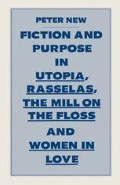Abstract
It is quite common for critics to conclude with avowals that they had no preconception of where their enquiry would lead them. I am not ashamed to confess that I had my end in view before I started. I wanted to show how one’s conception of the end of man affects one’s view of what he should be like, what he should do, and how it affects the possibilities of fictional form. To More and Johnson, the end of man was revealed, and self-proposed alternative ends are appraised by reference to that — the commonwealth or a choice of life leading to personal happiness. For George Eliot, the end was not divinely revealed, though it was inherited; and because it had not the status of revealed truth, it had to be made appealing through the rhetoric of form. The end had to be re-created within the form; and the form consequently could not function so completely as a means of appraisal; but her particular form, with the kinds of resistance which I have analysed, constitutes an at least partially successful discipline on the fantasies of self-proposed ends. In Lawrence, the end is self-proposed, not inherited; so it has to be not only made appealing but entirely generated within the form. So the form cannot function as resistance: in effect it advocates fantasy. In the three earlier writers, fiction works as a means of containing fantasy — recognising that it is a part of man’s nature, but a part which needs to be held in check through self-consciousness. In Lawrence, the distinction between fiction and fantasy has disappeared — the fiction embodies the fantasy.
Access this chapter
Tax calculation will be finalised at checkout
Purchases are for personal use only
Preview
Unable to display preview. Download preview PDF.
Copyright information
© 1985 Peter New
About this chapter
Cite this chapter
New, P. (1985). Conclusion. In: Fiction and Purpose in Utopia, Rasselas, The Mill on the Floss and Women in Love. Palgrave Macmillan, London. https://doi.org/10.1007/978-1-349-07704-5_17
Download citation
DOI: https://doi.org/10.1007/978-1-349-07704-5_17
Publisher Name: Palgrave Macmillan, London
Print ISBN: 978-1-349-07706-9
Online ISBN: 978-1-349-07704-5
eBook Packages: Palgrave Literature & Performing Arts CollectionLiterature, Cultural and Media Studies (R0)

